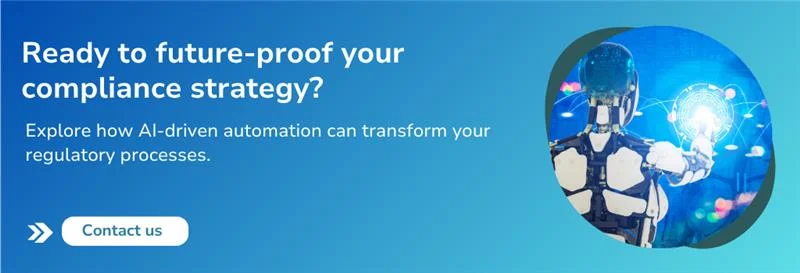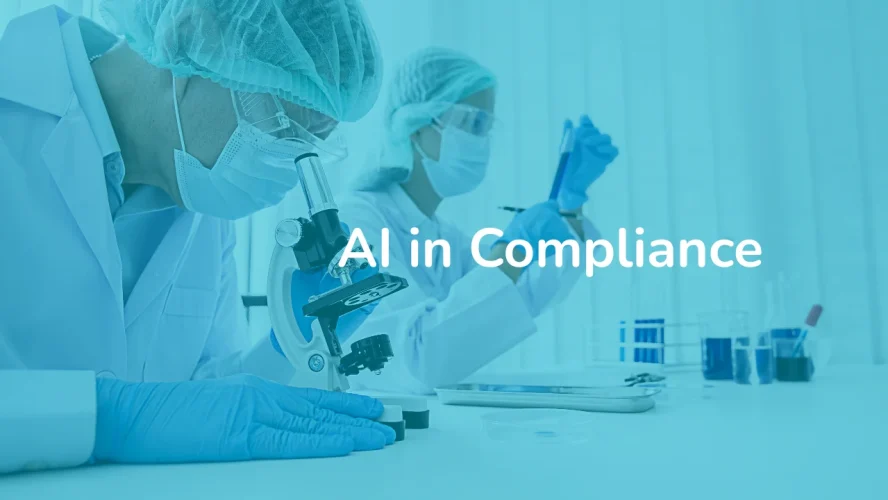The Gitnux 2025 Compliance Statistics report found that 59% of compliance breaches are caused by human error, and 40% of organizations experience difficulty in tracking compliance documentation after audits. With increasing complexity, growing cyber risks, and the high cost of manual processes, businesses are under pressure to enhance compliance frameworks. Artificial Intelligence (AI) in compliance is a game-changer, helping organizations navigate this evolving landscape with speed, precision, and resilience.
The Limitations of Traditional Compliance Approaches
Before delving into how AI is changing compliance, it’s essential to understand the limitations of traditional compliance processes:
- Manual Data Processing – Compliance audits, security assessments, and regulatory filings require extensive data collection and verification, often managed manually.
- High Operational Costs – Maintaining a compliance program requires significant investment in personnel, training, and software tools.
- Slow Response to Regulatory Changes – Regulatory frameworks frequently evolve, making it challenging for organizations to keep up without automated tracking.
- Inconsistent Compliance Monitoring – Periodic compliance checks leave gaps that can result in non-compliance and security vulnerabilities.
- Increased Human Error Risks – With compliance being an intricate process, manual intervention increases the risk of oversight or incorrect filings.
The Role of AI in Compliance Automation
AI-driven compliance tools address these challenges by providing real-time monitoring, automated reporting, and intelligent decision-making. Below are keyways how AI is transforming compliance:
1. Automated Risk Assessments
AI can analyze large data sets to detect anomalies, identify security threats, and assess compliance risks. Organizations can leverage AI-driven risk management systems to:
- Continuously scan for vulnerabilities in their IT systems.
- Score vendors based on their compliance posture.
- Identify potential fraud or insider threats through behavioral analytics.
For example, our DEA Validation solution automates Drug Distribution License checks, reducing costs by up to 70% while maintaining strict regulatory adherence.
2. Natural Language Processing (NLP) for Regulatory Compliance
With the vast amount of regulatory texts available, AI-powered NLP tools like FDA Search Bot can:
- Extract relevant compliance requirements from legal documents.
- Compare new regulatory updates with existing policies to suggest necessary changes.
- Automate review of contracts, privacy policies, and internal documentation.
3. AI-Powered Security Questionnaires
Security questionnaires are essential in vendor risk management but completing them manually can be slow and repetitive. AI-driven automation enables:
- Auto-filling responses using historical data.
- Intelligent suggestions for completing complex security assessments.
- Instant verification of responses against compliance frameworks such as SOC 2, ISO 27001, and GDPR.
- Automated redaction of sensitive information to protect PII and ensure data security.
4. Continuous Compliance Monitoring
Instead of conducting annual or quarterly audits, AI enables real-time compliance tracking. Functionalities extend into:
- Automated log analysis to detect policy violations.
- Instant alerts for non-compliant behavior or security threats with Audit Trails.
- Custom dashboards for real-time visibility into compliance and regulation adherence.
5. Predictive Compliance Analytics
AI can anticipate compliance risks before they become major issues. By analyzing past incidents and industry trends, predictive models help organizations:
- Identify patterns that could lead to non-compliance.
- Recommend proactive measures to mitigate risks.
- Benchmark compliance efforts against industry standards.
- CMC Automation simplifies Annual Report generation for regulatory submissions
Benefits of AI-Driven Compliance Automation
The advantages of AI-powered compliance automation go beyond efficiency and cost savings. Key benefits include:
- Reduced Human Workload – Teams spend less time on repetitive tasks, focusing instead on strategic initiatives.
- Faster Audits and Reporting – Faster, more accurate regulatory filings and audit readiness.
- Improved Accuracy – AI minimizes the risk of human errors that can lead to penalties or reputational damage.
- Better Resource Allocation – High-risk areas are identified and prioritized for immediate action.
- Scalability – AI-powered compliance solutions evolve at scale adapting to changes in regulation.
Overcoming Challenges in AI Compliance Implementation
Despite its benefits, implementing AI in compliance comes with challenges, including:
- Data Privacy Concerns – AI models require access to sensitive compliance data, necessitating robust privacy measures.
- Integration Complexity – AI solutions must seamlessly integrate with existing compliance frameworks and IT infrastructure.
- Regulatory Acceptance – Some regulatory bodies may be hesitant to fully embrace AI-driven compliance solutions.
Organizations must approach AI adoption with a well-structured strategy, ensuring regulatory alignment and data security best practices.
The Future of AI in Compliance
AI’s role in compliance will continue to grow as technology advances. Future developments may include:
- Self-learning Compliance Systems – AI models that continuously improve through real-time feedback.
- Autonomous Policy Enforcement – AI-driven governance tools automating internal controls and regulatory updates.
- Blockchain-Integrated Compliance – decentralized ledgers for transparent, tamper-proof regulatory verification
As AI becomes an integral part of compliance management, businesses that invest in automation today will be better positioned to navigate the complex regulatory landscape of the future.
Conclusion: Why AI in Compliance is Mission-Critical
Regulatory landscapes will only grow more complex. AI and automation offer more than efficiency—they deliver agility, risk reduction, and competitive advantage.
Forward-looking businesses that invest in AI-driven compliance today—leveraging tools like FDA Search Bot, DEA Validation, and integrated governance platforms—will be prepared to meet the challenges of tomorrow with confidence.


